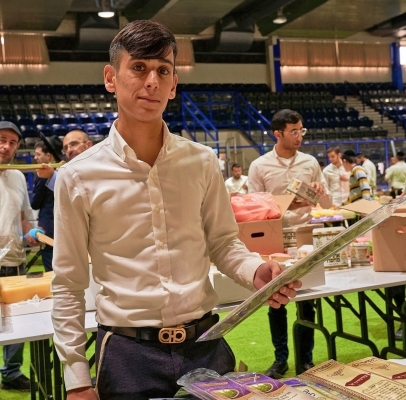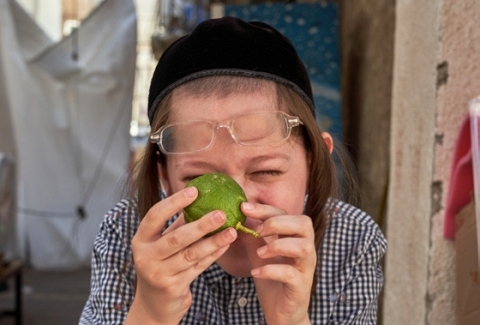Preparing for Succoth in Bnei Brak
The Haredim were busy preparing for the upcoming festival of Tabernacles. Apart from building the Sukkah which must have branches and leaves, they choose four different species of plants: etrog, palm, myrtle, and willow (Arba'at HaMinim). The process of procuring them is complex requiring minute examination of the four items, in order to obtain the best from the sellers. The men are responsible for this. As photography is my hobby, I decided to go out and try to record the selection process. Bnei Brak, in the center of Israel, was the closest large haredi community for me to investigate. Access was very difficult because of the traffic and narrow streets. The feeling was like landing in a totally foreign country. I had a similar feeling when I first stepped foot in India. I drove around without really knowing where to go and unable to find parking. Eventually I found a quiet side street where I was able to leave the car. I took my camera out and looked around. The surroundings were not very interesting and I wandered up the street looking for something better to photograph.
After a few minutes a young Haredi man walked towards me from the opposite direction. When he reached me, he stopped and asked me what I was going to photograph. I was a little apprehensive so I said "anything that might be interesting." I then asked him if there was somewhere close by where they sold Arba'at HaMinim. To my surprise he offered to take me there but informed me that we would have to go by car.
We returned to the car and set off. I drove according to his instructions, winding our way through the dense traffic. As we travelled, I took the opportunity to ask him some questions about himself. His name was David, twenty-one years old, and from a Moroccan family. He was in the process of meeting potential marriage partners. Of course, by parental arrangement. We started talking about haredi life and the deep divisions in Israeli society. There was no animosity between us. He was a very nice young man. To make a quite long conversation short, he said some things which are always surprising to a non-haredi. He said that he completely believed that his presence in the yeshiva helped save soldiers' lives. So, I asked him why the Shoah had not been prevented by the haredi community in Europe? He said that the sins of the Jews over hundreds of years had accumulated and caused the disaster. I then asked him what was the point of Yom Kippur if sins were never forgiven. He had no good answer to that.
We found a parking place near Akiva Street and walked to a sports hall. Inside there were trestle tables laid out with men and boys of all ages mingling inside. On the tables were the Arba'at HaMinim with many different sellers trying to attract attention. The sellers were mostly young. Once we were inside, David said he had to leave. I offered to return him to the pickup point but he was happy to wander around by himself in the very busy streets mostly full of women with young children. He left.
Now, I was alone in the sports hall with my camera; not knowing quite how the people inside would react to an outsider with a camera taking pictures. I need not have worried! The younger men and kids were interested in me and many wanted their picture taken. The children were lively and a lot of fun. The older men, who were engrossed in examining the Arba'at HaMinim, ignored me. At the end of the hall was a table where the serious experts were being consulted as to the worthiness of various items. I wandered around taking photos. I felt a rather joyous atmosphere. Most of all, I had the feeling that the men were under no pressure to hurry. This was what they did and they dedicated their lives to these kinds of activities. On the one hand, I envied them. Nobody was running after them with demands. On the other hand, it made me angry that I had led such a pressured existence, working long hours as a full-time hospital doctor, on call at night, unable to survive on my hospital salary, and therefore, also having to work evenings. I told this to one of my daughters who is a pediatrician. She had worked one day a week in a Bnei Brak clinic. She said that my experience was totally different to the one she would have had doing the same thing. She also reminded me about the role of women in the Haredi community. I had a lot to think about as I made my way home.










Comments